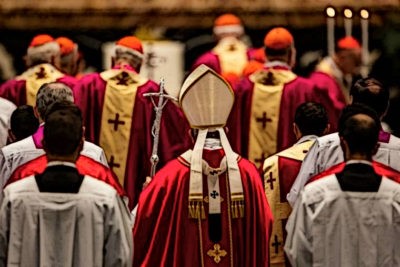– Rev José Mario O Mandía
We have identified two sources of knowledge about God and the world – Sacred Scripture and Sacred Tradition. These two sources, as we have seen, flow from one Apostolic Tradition.
Furthermore, we have seen that Sacred Tradition is not like a fossil to be studied by archaeologists, a petrified specimen of a lifeless object. No. Tradition is alive.
Pope Benedict XVI said in a General Audience on 3 May 2006, “Tradition is the river of new life that flows from the origins, from Christ down to us, and makes us participate in God’s history with humanity.” He added, “In the living river of Tradition, Christ is not 2,000 years away but is really present among us and gives us the Truth, he gives us the light that makes us live and find the way towards the future.”
So another set of questions arises. Who determines which books of the Bible teach the truth? Who decides which ancient writers qualify as Fathers? When there are – or seem to be – conflicting teachings, who acts as arbiter? Who can judge whether a new development in teaching is faithful to the teaching of Jesus Christ?
Apostolic Tradition needs something, some authority, to receive and safeguard it, to explore it, and to transmit it. That authority is what we call “Magisterium” (from Latin magister, “teacher”).
Indeed, the Catechism of the Catholic Church (no 84) teaches us: “The apostles entrusted the ‘Sacred Deposit’ of the faith (the depositum fidei), contained in Sacred Scripture and Tradition, to the whole of the Church.”
Jesus Christ, who is Priest, Prophet and King, gives the Church a three-fold mission: the priestly, prophetic and kingly mission. The prophetic mission includes a teaching function: the Magisterium.
Saint Paul explains the need for a teaching authority appointed and sent by Christ. “But how are men to call upon him in whom they have not believed? And how are they to believe in him of whom they have never heard? And how are they to hear without a preacher? And how can men preach unless they are sent?” (Romans 10:14-15)
The CCC states that “‘The task of giving an authentic interpretation of the Word of God, whether in its written form or in the form of Tradition, has been entrusted to the living teaching office [or Magisterium] of the Church alone. Its authority in this matter is exercised in the name of Jesus Christ’ (Dei Verbum 10, 2). This means that the task of interpretation has been entrusted to the bishops in communion with the successor of Peter, the Bishop of Rome.” (no 85)
This authority, however, “‘is not superior to the Word of God, but is its servant. It teaches only what has been handed on to it. At the divine command and with the help of the Holy Spirit, it listens to this devotedly, guards it with dedication and expounds it faithfully. All that it proposes for belief as being divinely revealed is drawn from this single deposit of faith’ (DV 10).” (CCC 86)
The CCC explains how the faithful (note that “faithful” includes bishops, clergy, lay people and religious) should regard the Magisterium: “Mindful of Christ’s words to his apostles: ‘He who hears you, hears me’ (Luke 10:16), the faithful receive with docility the teachings and directives that their pastors give them in different forms.” (CCC 87)
We can say, therefore, that our faith stands on a three-legged platform: Sacred Scripture, Sacred Tradition and Magisterium. The CCC affirms: “‘It is clear therefore that, in the supremely wise arrangement of God, Sacred Tradition, Sacred Scripture and the Magisterium of the Church are so connected and associated that one of them cannot stand without the others. Working together, each in its own way, under the action of the one Holy Spirit, they all contribute effectively to the salvation of souls’ (DV 10).” (no 95)


 Follow
Follow


